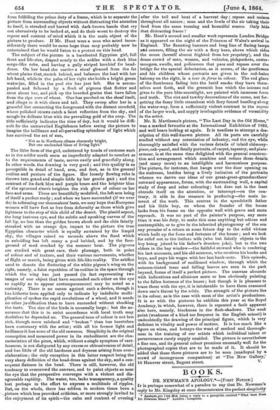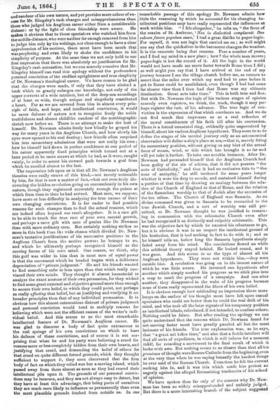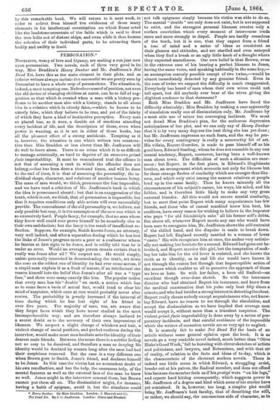DR NEWMAN'S APOLOGY.*—[FIRST NOTICE.]
* Apologia pro V&5 Nth, being a reply to a pamphlet entitled "What then Does
London : Longman.
and candour of his own nature, and yet provides more colour of ex- cuse for Mr. Kingsley's rash charges and misapprehensions than those who judged his Anglican career either from a considerable &stenos or by the light of close friendship were aware. He makes it obvious that to those spectators who watched him from the middle-distance, who were neither far enough removed from him to judge him only by his writings, nor close enough to have a clear apprehension of his motives, there must have been much that was perplexing and even likely to shake the confidence in his simplicity of purpose. At the same time we not only hold to our first impression that there was absolutely no justification for Mr. Kingsley's rash accusation, but we can scarcely conceive that Mr. Kingsley himself can read this apology without the profoundest personal conviction of the stedfast uprightness and true simplicity of Dr. Newman's theological career. We have reason to be glad that the charges were made, if only that they have elicited a book which so greatly enlarges our knowledge, not only of the upper currents of a wide intellect, but of the deep-sea soundings of at least as wide, though unique and singularly constituted a heart. Far as we are severed' from him in almost every prin- ciple of faith, and hope, and intellectual conviction, it would be mere dulness of nature not to recognize freely the noble truthfulness and almost childlike candour of the autobiographic sketch now before us. There is no attempt to make the best of himself. Dr. Newman admits freely how blindly he groped his way for many years in the Anglican Church, and how slowly his eyes were opened to his real destiny ; how friends often surprised him into momentary admissions that were not really his own ; how he himself laid down in perfect confidence at one period of his career apparently fixed principles which turned out at a later period to be mere straws at which he had, as it were, caught vainly, in order to arrest his onward path towards a goal from which be recoiled almost to the last.
The impression left upon us is that all Dr. Newman's Anglican theories were really straws of this kind,—not merely untenable by him, for that is now a matter of fact,—but not even truly dis- covering the hidden revolution going on unconsciously in his own nature, though they registered accurately enough the points at which from time to time he had arrived. Most men, we suppose, have more or less difficulty in analyzing the true causes of their own changing convictions. It is far easier to find possible reasons for such changes than to find the actual reasons, which are indeed often beyond our reach altogether. It is a rare gift to be able to touch the true root of your own mental growth, and perhaps a rarer gift with men of genius like Dr. Newman than with more ordinary men. But certainly nothing strikes us more in this book than th3 wide chasm which divided Dr. New- man's tentative justifications of his successive positions in the Anglican Church from the motive powers he betrays to us, and which he ultimately perhaps recognized himself as the moving forces of his own mind. One reason, we think, why this gulf was wider in him than in most men of equal power is that the movement which he headed began with a deliberate depreciation of "private judgment." He and his friends wanted to find something safer to lean upon than that which really con- vinced their own minds. They thought it almost immaterial to analyze the exact sources of their own persuasion, for they wished to find some great external and objective ground more than enough to secure their own belief, to which they could point, not perhaps as really effecting that belief, but as justifying and verifying it on broader principles than that of any individual persuasion. It is obvious how this almost ostentatious distrust of private judgment and personal conviction would tend to multiply reasons for believing which were not the efficient causes of the writer's indi- vidual belief. And this seems to us the most remarkable intellectual feature of Dr. Newman's Anglican career. He was glad to discover a body of fact quite extraneous to the real springs of his own convictions on which to base his defence of those convictions, and of course it is not sur- prising that when he and his party were believing a creed for reasons more or less completely hidden from their own hearts, and justifying that creed, and demanding the belief of others for that creed on quite different formal grounds, which they thought sufficient to support it, they soon discovered that the firm body of fact on which they relied was but a moving island, which passed away from them almost as soon as they had reared their intellectual pile upon it. The grounds of our personal convic- tions may be insecure, and they are not always easy to detect, but they have at least this advantage, that being parts of ourselves they are much more likely to influence us permanently than even the most plausible grounds fetched from outside us. In one remarkable passage of this apology Dr. Newman admits how little the reasoning by which he accounted for his changing in- tellectual positions may have really represented the influences at work within him. "I felt altogether," he tells us, "the force of the maxim of St. Ambrose, Non in dialectics:1 complacuit Dee salvum facere populum suum,' I had a great dislike to paper-logic. For myself, it was not logic that carried me on ; as well might one say that the quicksilver in the barometer changes the weather. It is the concrete being that reasons. Pass a number of years, and I find my mind in a new place ; how? the whole man moves ; paper-logic is but the record of it. All the logic in the world would not have made me move faster towards Rome than I did ; as well might you say that I have arrived at the end of my journey because I see the village church before me, as venture to assert that the miles over which my soul had to pass before it got to Rome could be annihilated, even though I had had some far clearer view than I then had that Rome was my ultimate destination. Great acts take time." This is both true and fine. But with Dr. Newman the logic of his various stages of opinion scarcely even registers, we think, the, track, though it may per- haps register the rate, of his advance. The true logic of con- viction is the expression of that which convinces us. And we do not find much that impresses us as a real reflection of the moral constituents of his faith till after his conversion. There is a forced unnatural ring, evidently quite unperceived by himself, about his various Anglican hypotheses. They seem to us to define the stages of his mental journey only as an astronomical observation will define a ship's place at sea,—that is, merely fixing its momentary position, without giving us any hint of the actual force of steam, wind, or tide which has brought it so far and will yet take it further. To take one notable instance. After Dr. Newman had persuaded himself that the Anglican Church had been guilty of the sin of schism, that it did not possess "the note of Catholicity," and that it had no exclusive title to "the note of antiquity," he still hesitated for some years longer whether it were his duty to secede, and sustained himself during a portion of that time by drawing an analogy between the rela- tion of the Church of England to that of Rome, and the relation of the Samaritan worship to that of Judah after the secession of the ten tribes. The Church of England was Samaria. As no divine command was given to Samaria to be reconciled to the true Jewish Church, and a sort of worship was still per- mitted, so Dr. Newman thought he was justified in remain- ing in communion with the schismatic Church even after he had recognized it as distinctly and culpably schismatic. This was the objective fact by which he excused his reluctance to go, but it is obvious it was in no respect the intellectual ground of his hesitation, that it had nothing in fact to do with it ; and as he himself tells us, before long the Samaria hypothesis simply faded away from his mind. His convictions flowed on while this artificial theory stayed behind. He looked round, and it was gone. And this seems to us the type of almost all his Anglican hypotheses. They were not within him,—they were outside him. A. revolution was going on in his inmost nature of which he was little aware. He invented one hypothesis after another which simply marked his progress as we stick pins into a map to mark the progress of a campaign. And one after another, they disappeared in the wake of his progress because none of them really represented the fibres of his own belief.
It is obvious enough how misleading an impression these mere buoys on the surface of his thought must have left upon casual spectators who could see better than he could the real drift of his mind, and who took all the later signals of his temporary position as intellectual blinds, calculated, if not intended, to confuse others. Nothing could be falser. But after reading the apology we can quite understand that the reasons which Dr. Newman found for not moving faster must have greatly puzzled all but the most intimate of his friends. The true explanation was, as he says, that a great act takes time," and also that a fertile intellect will find all sorts of expedients, in which it will believe for a moment itself, for retarding a movement to the final result of which it looks with awe. But nothing seems to us clearer than that all his prernisses of thought were Roman Catholic from the beginning, even at the very time when he was saying honestly the hardest things he ever said of the Roman Church. Even then he felt the current sucking him in, and it was this which made him protest so eagerly against the alleged Romaniziog tendencies of his school of opinion. • We have spoken thus far only of the reasons why Dr. New- man has been so widely misapprehended and unfairly judged. But there is a more interesting branch of the subject suggested by this remarkable book. We will return to it next week, in order to collect from himself the evidences of those many elements in his intellectual constitution on which Rome acted like the loadstone-mountain of the fable which is said to draw the iron bolts out of distant ships, and even while it thus loosens the cohesion of their individual parts, to be attracting them bodily and swiftly to itself.
































 Previous page
Previous page